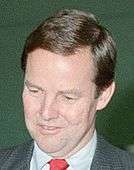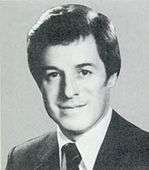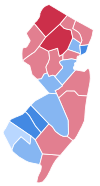New Jersey gubernatorial election, 1981
| | ||||||||||||||||||||||
| ||||||||||||||||||||||
| ||||||||||||||||||||||
|
| ||||||||||||||||||||||
| Kean 60–70%
Kean 50–60%
Florio 60–70%
Florio 50–60%
Florio <50% | ||||||||||||||||||||||
| ||||||||||||||||||||||
The New Jersey gubernatorial election of 1981 was a race for Governor of New Jersey held on November 3, 1981. Republican Thomas Kean narrowly defeated Democrat James Florio with 49.46% of the vote following a recount of the ballots.[1]
Primary elections
Primary elections were held on Tuesday June 2, 1981.[2]
Republican primary
Candidates
- Anthony Imperiale, State Assemblyman
- Thomas Kean, former Speaker of the Assembly
- Lawrence Francis Kramer, former Mayor of Paterson
- Richard McGlynn, former Superior Court Judge
- Barry T. Parker, State Senator
- John K. Rafferty, Mayor of Hamilton
- Bo Sullivan, businessman
- James Wallwork, State Senator
Results
| Party | Candidate | Votes | % | |
|---|---|---|---|---|
| Republican | Thomas Kean | 122,512 | 30.75 | |
| Republican | Lawrence Francis Kramer | 83,565 | 20.98 | |
| Republican | Bo Sullivan | 67,651 | 16.98 | |
| Republican | James Wallwork | 61,816 | 15.52 | |
| Republican | Barry T. Parker | 26,040 | 6.54 | |
| Republican | Anthony Imperiale | 18,452 | 4.63 | |
| Republican | John K. "Jack" Rafferty | 12,837 | 3.22 | |
| Republican | Richard McGlynn | 5,486 | 1.38 | |
| Total votes | ' | 100.00 | ||
Democratic primary
Candidates
- Herbert J. Buehler, State Senator
- John J. Degnan, New Jersey Attorney General
- Frank J. Dodd, State Senator
- James Florio, U.S. Representative
- Kenneth A. Gibson, Mayor of Newark
- William J. Hamilton, State Senator
- Ann Klein, Human Services Commissioner
- Stella E. Mann
- Barbara McConnell, State Assemblywoman
- Joseph P. Merlino, President of the New Jersey Senate
- Rose Zeidwerg Monyek
- Robert A. Roe, U.S. Representative
- Thomas F. X. Smith, Mayor of Jersey City
Results
| Party | Candidate | Votes | % | |
|---|---|---|---|---|
| Democratic | James Florio | 164,179 | 25.92 | |
| Democratic | Robert A. Roe | 98,660 | 15.58 | |
| Democratic | Kenneth A. Gibson | 95,212 | 15.03 | |
| Democratic | Joseph P. Merlino | 70,910 | 11.20 | |
| Democratic | John J. Degnan | 65,844 | 10.40 | |
| Democratic | Thomas F. X. Smith | 57,479 | 9.08 | |
| Democratic | Frank J. Dodd | 23,866 | 3.77 | |
| Democratic | William J. Hamilton | 17,395 | 2.75 | |
| Democratic | Barbara McConnell | 16,123 | 2.55 | |
| Democratic | Ann Klein | 14,844 | 2.35 | |
| Democratic | Herbert J. Buehler | 4,266 | 0.67 | |
| Democratic | Stella E. Mann | 2,375 | 0.38 | |
| Democratic | Rose Zeidwerg Monyek | 2,129 | 0.34 | |
| Total votes | ' | 100.00 | ||
General election
Candidates
Major party candidates
- Thomas Kean, Republican
- James Florio, Democratic
Other candidates
- Bill Gahres, Down With Lawyers
- Chester Grabowski, The Suffering Majority
- Jack Moyers, Libertarian
- Paul B. Rizzo, Independent-Honest-Available
- Harry J. Gaynor, Leadership By Example
- James A. Kolyer, III, Middle Class Candidate
- Jules Levin, Socialist Labor Party of America
- Charles C. Stone, Jr., Federalist
- James E. Harris, Socialist Workers Party
- Ernest D. Pellerino, Law & Order
- Jasper C. Gould, Contempt of Court
Results
The results of the initial ballot counting was close with Kean leading Florio by 1,677 votes. Two television networks had actually called the race for Florio at the time.[1] State Democrats had accused the Republican National Committee of intimidating minority voters in Newark, Camden, and Trenton by setting up the Ballot Security Task Force which sent out mailers to voters in these cities and posted armed off-duty police officers and large signs at certain precincts.[3] A recount took place over the next month and Kean was certified the winner besting Florio by 1,797 votes out of over 2.3 million votes cast.[1]
| Party | Candidate | Votes | % | ± | |
|---|---|---|---|---|---|
| Republican | Thomas Kean | 1,145,999 | 49.46% | ||
| Democratic | James Florio | 1,144,202 | 49.38% | ||
| Independent | Bill Gahres | 4,525 | 0.20% | ||
| Independent | Chester Grabowski | 4,496 | 0.19% | ||
| Libertarian | Jack Moyers | 2,377 | 0.10% | ||
| Independent | Paul B. Rizzo | 2,336 | 0.10% | ||
| Independent | Harry J. Gaynor | 2,209 | 0.10% | ||
| Independent | James A. Kolyer, III | 2,144 | 0.09% | ||
| Socialist Labor | Julius Levin | 2,073 | 0.09% | ||
| Independent | Charles C. Stone, Jr. | 1,948 | 0.08% | ||
| Socialist Workers | James E. Harris | 1,681 | 0.07% | ||
| Independent | Ernest D. Pellerino | 1,647 | 0.07% | ||
| Independent | Jasper C. Gould | 1,602 | 0.07% | ||
| Majority | |||||
| Turnout | 2,317,239 | 100.00% | |||
| Republican gain from Democratic | Swing | ||||
References
- 1 2 3 "Election night 1981, when the N.J. governor's race was too close to call". NJ.com. 2009-11-03. Retrieved 2015-08-18.
- 1 2 3 "Candidates for the Office of Governor - State of New Jersey" (PDF). Secretary of State of New Jersey. 1981. Retrieved August 17, 2015.
- ↑ Joffee, Robert (November 8, 1981). "Democrats Accuse GOP of Intimidating Minorities in N.J. Voting". Washington Post. Retrieved June 25, 2016.
- ↑ "Votes Cast for the Office of Governor of the State of New Jersey" (PDF). Secretary of State of New Jersey. 1981. Retrieved August 17, 2015.


